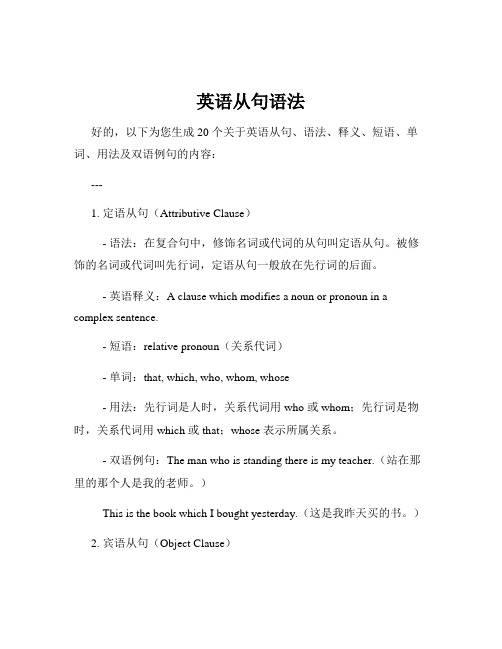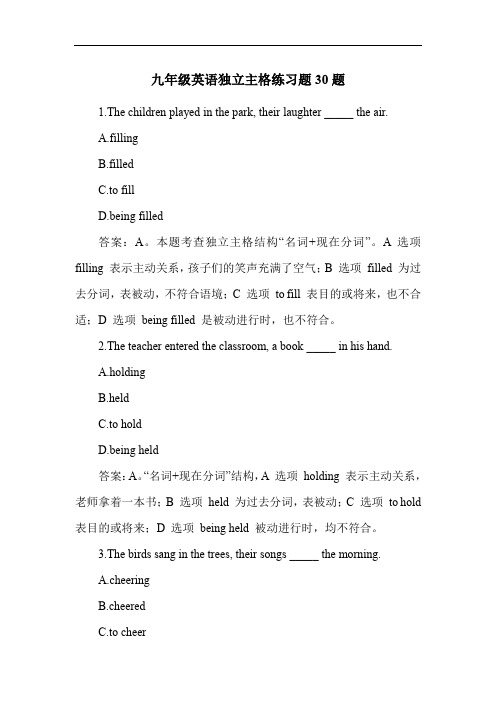26 preposition and preposition phrase
PowerPoint presentation on 26 letters and natural

Introduction to the concept of the "explosive phenomenon of loss," which refers to the tendency for certain sounds to be lost or weakened in connected speech, and how to compensate for this when reading aloud.
Dog
/dɒɡ/ - a domesticated carnivorous mammal that typically has a long snout, an acute sense of smell, and a barking, howling, or whining voice.
Sun
/sʌn/ - the star that is the source of light and heat for the planets of the solar system.
Vowels and Combination Pronunciation
Vowels
English has five main vowel sounds: a, e, i, o, u. Each vowel can have multiple pronunciations depending on its position in a word and the surrounding letters.
/bəˈnɑːnə/ - a long curved fruit that grows in clusters and has soft pulpy flesh and
英语从句语法

英语从句语法好的,以下为您生成 20 个关于英语从句、语法、释义、短语、单词、用法及双语例句的内容:---1. 定语从句(Attributive Clause)- 语法:在复合句中,修饰名词或代词的从句叫定语从句。
被修饰的名词或代词叫先行词,定语从句一般放在先行词的后面。
- 英语释义:A clause which modifies a noun or pronoun in a complex sentence.- 短语:relative pronoun(关系代词)- 单词:that, which, who, whom, whose- 用法:先行词是人时,关系代词用 who 或 whom;先行词是物时,关系代词用 which 或 that;whose 表示所属关系。
- 双语例句:The man who is standing there is my teacher.(站在那里的那个人是我的老师。
)This is the book which I bought yesterday.(这是我昨天买的书。
)2. 宾语从句(Object Clause)- 语法:在句子中起宾语作用的从句叫做宾语从句。
宾语从句分为三类:动词的宾语从句,介词的宾语从句和形容词的宾语从句。
- 英语释义:A clause that functions as the object of a verb, a preposition or an adjective in a sentence.- 短语:object complement(宾语补足语)- 单词:if, whether, that- 用法:宾语从句要用陈述句语序;一般情况下,if 和 whether 可以互换,但在whether...or not 结构中,以及在介词后,只能用whether。
- 双语例句:I don't know if/whether he will come.(我不知道他是否会来。
Preposition and Prepositional PhraseLecture26

26.1 Collocation of prepositions with adjectives, verbs and nouns 1) Prepositions after adjectives Eg. alive to , alive with 2) Prepositions after verbs a) Verb+ preposition, eg. Prevail on, appeal to, apply for, etc. b) verb + object + preposition , eg. Exclude….from, take…for
26. 3 Transformational relations between prepositional phrases and subordinate clauses
1) Prepositional phrase vs that-clause Eg. Are you sure of Simon’s disappearance?= Are you sure that Simon has disappeared? 2) Prepositional phrase vs adverbial clause Eg. Despite the city’s any attraction, John still preferred his cottage in the country. = Although the city has many attraction , John still preferred his cottage in the country. 3) Prepositional phrase vs relative clause Eg. The man with a a red beard is talking to Henry’s father. = The man who has a read beard is talking to Henry’s father.
《大学英语语法》课件—07Phrases Prepositional phrase

• My older daughter graduated from school. • She then took a job. • My older daughter took a job after school.
• When I studied, I had many questions about my selective courses.
modifies the verb.)
2.3. As a noun When used in conjunction with the verb form to be, the
prepositional phrase functions as a noun and acts as a predictive to express the existence or state of being of the subject.
• “Coming!" Away she skimmed over the lawn, up the path, up the steps, across the veranda, and into the porch.
26 Prep& Prepositional phrase

Collocation of prepositions with adjectives, verbs and nouns Prepositions after adjectives
a) rich in, intent on, indifferent to, …
b) alive to v.s. alive with c) Joe was very disappointed at not finding her at home. His parents will be disappointed with her if she fails the exam.
Complex preposition Complex compositions, also known as “multi-word prepositions”, refer to combinations that consist of two or more than two words and which perform the function of simple prepositions.
• Prepositions are words that are used before a noun or a noun phrase to show time, place, movement, etc. • A preposition can also be used before a verb in the –ing form.
Transformational relations between prepositional phrases and subordinate clauses
1) Prepositional phrase vs that –clause Are you sure of Simon’s disappearance? = Are you sure that Simon has disappeared?
九年级英语独立主格练习题30题

九年级英语独立主格练习题30题1.The children played in the park, their laughter _____ the air.A.fillingB.filledC.to fillD.being filled答案:A。
本题考查独立主格结构“名词+现在分词”。
A 选项filling 表示主动关系,孩子们的笑声充满了空气;B 选项filled 为过去分词,表被动,不符合语境;C 选项to fill 表目的或将来,也不合适;D 选项being filled 是被动进行时,也不符合。
2.The teacher entered the classroom, a book _____ in his hand.A.holdingB.heldC.to holdD.being held答案:A。
“名词+现在分词”结构,A 选项holding 表示主动关系,老师拿着一本书;B 选项held 为过去分词,表被动;C 选项to hold 表目的或将来;D 选项being held 被动进行时,均不符合。
3.The birds sang in the trees, their songs _____ the morning.A.cheeringB.cheeredC.to cheerD.being cheered答案:A。
A 选项cheering 是现在分词,表主动,鸟儿的歌声使早晨充满活力;B 选项cheered 过去分词表被动;C 选项to cheer 表目的或将来;D 选项being cheered 被动进行时,不符合。
4.The wind blew strongly, the leaves _____ in the air.A.flyingB.flownC.to flyD.being flown答案:A。
“名词+现在分词”,A 选项flying 表主动,风把树叶吹在空中飞舞;B 选项flown 过去分词表被动;C 选项to fly 表目的或将来;D 选项being flown 被动进行时,不符合。
英语语法----介词Preposition(Prep.)

英语语法----介词Preposition(Prep.)一、定义:用在n.(或相当于n.的其它词类、短语或从句)之前,说明其与句子中另一成分的关系的词,又称前置词。
二、分类:3种1.简单介词(simple prepositions) e.g. about, above, behind, besides, down, during, in, near, round, since, towards, with2.复合介词(compound prepositions) e.g. from among, from behind, from under, inside, outside, within, without, into, onto, out of, upon, throughout 3.短语介词(phrasal prepositions) e.g. according to, apart from(除……之外), as a result of, as for/to(至于,关于), because of, due to(由于), in addition to(除……之外,不但= besides, in front of, in spite of(尽管), instead of, owing to(由于)三、常见简单介词的基本用法1.about 1)关于,有关 e.g. ihave not heard so much ~ him. i don’t know what you’re talking ~. 2)差不多,大约 e.g. about 500 ss attended the lecture. aboutwhen will you go abroad? 3)表示地点:在周围,在附近,各处,到处e.g. trees are planted ~ the lake. they live somewhere~ the people’s square. don’t leave your books~ your desk. i haven’tany small change ~/on me. 4)“即将”(近期将来)e.g. thefilm is ~ to begin. it’s nearly 7:00. the train is ~ to leave.2.above 1)在……上方 e.g.a bird is flying above the woods. there isa portrait above the blackboard. 2)(在数量上)超过 e.g. the man is notyet forty, but well ~thirty.the number of new ss this year is ~four hundred.3)(能力等)胜过,超越;因太困难、太好而不…… e.g.the problemis ~ me. (这问题太难我不懂。
位置介词(Positionpreposition)

位置介词(Position preposition)英语中,穿过,通过,,附近,下,前,后,,,等介词均可用来表示位置关系请听我细细道来之间:一、在意为”横过;在对面”,表示从物体表面上穿过,着重指”从一边到另一边例如”:我们穿过街道。
我们走过了大街。
你能游过这条河吗?你能游过那条河吗?他们打算在这条河上建一座桥。
他们打算在河上建一座桥。
[特别提醒]在不能作动词,通常在其前加走,走,跑等动词构成谓语成份交叉可单独作谓语。
顺便说一下,在也可用作副词,意为”从一边到另一边”在对面”到对面例如”:你能跳过去吗?你能跳过去吗?二、通过意为”穿过;横过”。
通过与在均可表示在一定范围内从一边穿过到另一边,但两者的用法有区别。
表示动作是从物体的表面穿过时,多用横穿;表示从物体中间通过或穿过时,多用例如通过:让我们走过冰。
咱们从冰上走过去吧。
让我们穿过这片森林。
让我们穿过这片森林吧。
三、在意为”在......上面”,指一件东西在另一件之上,物体与物体的表面相接触。
例如:桌子上有一些书。
桌上有一些书。
你能看见墙上的画吗?你能看见墙上的画吗?四、近意为”在......旁”在......附近例如”:这附近有一家银行。
这附近有一家银行。
窗户附近有两个球。
窗户附近有两个球。
五、下指在某物的正下方,有垂直在下的意思。
例如:我们在树下休息。
咱们在树下休息一会儿吧。
桥下有什么?桥底下有什么?在表示”在......的前面”,即处在某个人或某个地方范围外的前面六、例如前面:教室前面有两棵大树。
教室的前面有两棵大树。
谁在玛丽前面?谁在玛丽的前面?他们正站在黑板前面。
他们正站在黑板前面。
七、背后意为”在......的后面”,与恰好相反例如前面:自行车在树后面。
那辆自行车在树后面。
门后面有扫帚吗?门后面有扫帚吗?在还可以表示时间,意为”迟于例如”:火车已经过时了。
火车晚点了。
八、在表示位置时,意为”在(某一地点或场合)”,通常指在小地点。
- 1、下载文档前请自行甄别文档内容的完整性,平台不提供额外的编辑、内容补充、找答案等附加服务。
- 2、"仅部分预览"的文档,不可在线预览部分如存在完整性等问题,可反馈申请退款(可完整预览的文档不适用该条件!)。
- 3、如文档侵犯您的权益,请联系客服反馈,我们会尽快为您处理(人工客服工作时间:9:00-18:30)。
• 如果你没有某种可比较的东西,你就永远也不会 真正明白什么是幸福。 • 此外,在cannot compare这一结构中,compare to与with是无区别的。 • e.g. Social life in a village cannot compare to/with that of a large city. • The south of England is certainly beautiful but it can’t compare with/to the south of France for sunshine. • 英格兰南部诚然是美丽的,但是,就充足的阳光 而言,它与法国南部是无eposition and Prepositional Phrase
Teaching Contents
• 26.1 Collocation of prepositions with adjectives, verbs and nouns • 26.2 Complex prepositions • 26.3 Transformational relations between prepositional phrase and subordinate clauses
• 26.2 Complex prepositions • Complex prepositions, also known as “multiword prepositions”, refer to combinations that consist of two or more than two words and which perform the function of simple prepositions. They can be divided into: • 1) Two-word prep. e.g. according to, except for, ahead of • 2) Three-word prep. e.g. at variance with, in spite of, by way of, on/under pain of • 3) Four-word prep. e.g. at the expense of, on the ground of, at the mercy of, on the point of
• But there are other adjectives that can collocate with different prepositions to express different meanings, e.g. alive to vs. alive with. • There are also adjectives that can be followed by different prepositions without change in meaning, the choice of prepositions being determined by the noun or pronoun that follows. • e.g. Joe was very disappointed at not finding her at home. • His parents will be disappeared with her if she fails the exam.
besides / except • 1)在否定句中,二者没有区别:除(外)。 • I care for nothing besides this. 除了这个之外,我什么 都不要。 • Nobody besides Emily had skis.除了艾米利之外,谁也 没有滑雪板。 • 2)besides表示“包括、相加”:e.g. What language do you know besides English? • except表示排除在外:He gets up early everyday except Sunday. • Except vs. except for • 目前人们用法较灵活,没有大的区别;但是,句首一般 使用except for,不用except。当然,except for也用在 句末,但 介词短语前只用except。 • e.g. None of us had any money, except (for) James. • Except for Xiao Li, we all attended the meeting. • We go to bed before 10, except in summer.
• • • • •
• • •
2) Preposition after verbs a) verb + prep. e.g prevail on, appeal to b) verb + object + prep. e.g. exclude…from c) verb + adverb particle + prep. e.g. break in on, come up against d) verb + object + adverb particle + prep. e.g. take one’s resentment out on, put something over on 3) Collocation of prepositions with nouns a) noun + prep. e.g. a solution to, faith in, a glance at b) prep. + noun e.g. on one’s guard, at one’s request, in all probability
• 2) Prep. phrase vs. adverbial clause • e.g. Despite the city’s many attractions, Johnny still preferred his cottage in the country. • = Although the city has many attractions, Johnny still preferred his cottage in the country. • 3) Prepositional phrase vs. relative clause • The man with a red bear is talking to Henry’s father. • = The man who has red beard is talking to Henry’s father.
• Preposition is just a class of structural words that indicate various semantic relations between words or expressions. • 26.1 Collocation of prepositions with adjectives, verbs and nouns • 1) Prepositions after adjectives • Adjectives can collocate with prepositions to form adjective phrases. • Some adjectives can only be followed by specific prepositions, e.g. rich in, intent on, indifferent to.
• 26.3 Transformational relations between prepositional phrase and subordinate clauses • Prepositional phrases, which are used as adverbial in clauses and as modifiers in noun phrases, have transformational relations with some subordinate clauses that perform the same syntactic functions. • 1) Prep. phrase vs. that-clause • Are you sure of Simon’s disappearance? • = Are you sure that Simon has disappeared?
• .Compare …to / with • Compare … to “把…比作”;compare … with “将… 与…作比较” • e.g. Shakespeare compared the world to a stage. • 将人世比作舞台 • In the Bible, Christians are compared to sheep, evil persons to goats, and the use of wine to serpents. • 在《圣经》中,基督教被比作绵羊,坏人被比作山羊, 饮酒被比作毒蛇。 • The police compared the fingerprints on the gun with these on the door. 将枪上的指纹与门上的相比较。 • 在较少的情况下,人们有时用compare…to来表达 “将…同…作比较”的意思。 • e.g. You’ll never really know what happiness is unless you have something to compare it to.
despite / in spite of/ for all / with all / not withstanding都 表示让步,其区别不在意义上,而是在语域语体上。 • 最长使用的是in spite of,据说特别受到新闻工作者的 偏爱。 • Despite比较正式,TOEFL几乎总要求使用这个介词。 • e.g. *Despite of heavy rain, the party set out in the morning. • For all / with all是较口语化的词。 • e.g. For all/with all this noise, I managed to get some sleep. • Notwithstanding用于正式语体,尤其是法律文件中。 • e.g. Notwithstanding any other agreements, we will make a new contract with the firm.
